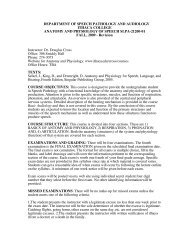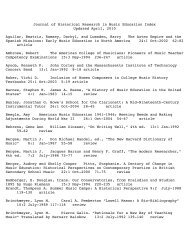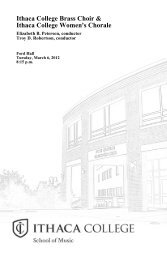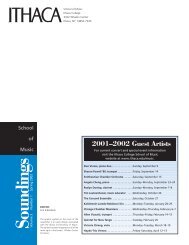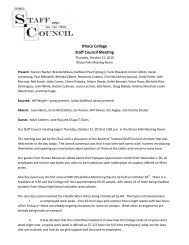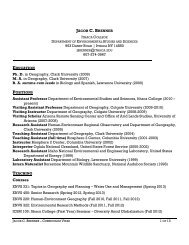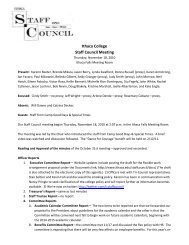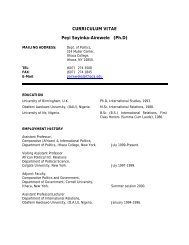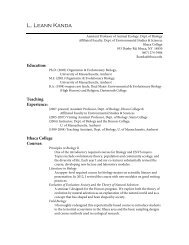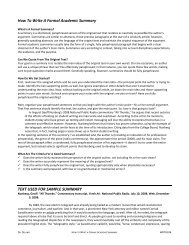A Brief Defense of Empiricism - Ithaca College
A Brief Defense of Empiricism - Ithaca College
A Brief Defense of Empiricism - Ithaca College
Create successful ePaper yourself
Turn your PDF publications into a flip-book with our unique Google optimized e-Paper software.
A <strong>Defense</strong> <strong>of</strong> “Naïve” <strong>Empiricism</strong> page 3 <strong>of</strong> 14<br />
is untenable. If so, then perhaps the only road is to treat empiricism as a proposal or<br />
stance as van Fraassen urges (2002). 2<br />
Fortunately the empiricist has a cogent reply to these objections although not<br />
one that empiricists have hitherto resorted to, except obliquely. 3 I propose to defend<br />
the claim that the fundamental principle <strong>of</strong> empiricism is an empirical hypothesis, and<br />
can be advanced in a way that avoids the objections that empiricism is self-refuting or<br />
engaged in dogmatic metaphysics. Van Fraassen‟s objections notwithstanding,<br />
consistent with empirical principles, empiricism is an empirical theory that does not<br />
“lose its bite or bite its own tail.” Once we see that the objections <strong>of</strong> dogmatism and<br />
self-refutation have no bite, we can ask the question whether the fundamental<br />
principle <strong>of</strong> empiricism has strong empirical support and is worthy <strong>of</strong> our allegiance.<br />
I will answer that it does and is.<br />
First, Hempel‟s statement <strong>of</strong> the fundamental principle <strong>of</strong> empiricism needs<br />
some clarification. 4 Hempel‟s statement suggests but does not entail that analytic<br />
knowledge is not based on experience. Modern empiricists following Russell,<br />
Whitehead, and Wittgenstein <strong>of</strong> the Tractatus held that mathematics, logic, and<br />
geometry are analytic or tautological and that analytic propositions do not represent<br />
full-bodied knowledge; they do not represent any matters <strong>of</strong> fact beyond the meanings<br />
<strong>of</strong> terms or conventions about their meanings. The logical positivists claimed that<br />
mathematics, although fascinating and surprising, is not substantial and knowledge <strong>of</strong><br />
mathematical truths is not knowledge <strong>of</strong> substantial matters, not knowledge <strong>of</strong> matters<br />
<strong>of</strong> fact. The idea is that analytic propositions are purely formal or non-substantive<br />
and thus are no threat to empiricism. The positivists‟ claims about mathematics being<br />
analytic may not be correct; there may be no analytic propositions; or the distinction<br />
between analytic and synthetic propositions may be bogus. While each <strong>of</strong> these<br />
claims has been the subject <strong>of</strong> intense debate, all <strong>of</strong> this is irrelevant to the purpose at<br />
hand. The point is that we are interested in non-analytic knowledge. 5 This is what<br />
modern empiricists and their modern opponents are contending about. Clearly<br />
Hempel was intending by the phrase “non-analytic knowledge” to exclude knowledge<br />
<strong>of</strong> basic logic, mathematics, geometry, and seemingly purely trivial, conventional, or<br />
formal props like “January has 31 days,” “All grandmothers have had children,” and<br />
so on from the sweep <strong>of</strong> the fundamental principle <strong>of</strong> empiricism. Also he would<br />
probably exclude claims such as “Nothing can be both red and green all over at the<br />
same time” which can plausibly be given a somewhat formal treatment (Putnam 1956,<br />
1957). Empiricists can give the rationalists a priori (i.e. non-experiential) knowledge<br />
<strong>of</strong> these sorts <strong>of</strong> propositions as long as a priori knowledge does not extend beyond<br />
these; in particular as long as a priori knowledge does not extend to substantive<br />
propositions such as that an omniscient, omnipotent God exists or each human being<br />
has an immortal soul. For rationalism to <strong>of</strong>fer a defeating challenge to empiricism<br />
some substantive non-analytic propositions would have to be knowable a priori. This<br />
is what empiricists deny. Empiricists, at least those that follow Hempel, hold that all<br />
substantive knowledge is based on experience. I do not think that Hempel would be<br />
troubled if all the opponents <strong>of</strong> empiricism could come up with as knowable a priori<br />
are logic, mathematics, and propositions such as the formal ones cited above, even if<br />
the explanation <strong>of</strong> the a prioricity <strong>of</strong> these is not precisely that <strong>of</strong>fered by the logical<br />
positivists. 6<br />
“Based on experience” is itself an unclear and metaphorical phrase and<br />
empiricists have disagreed about how to understand it. Clearly Hempel means by<br />
“experience” “sensory experience, memory, and experience <strong>of</strong> our own conscious<br />
mental states” but beyond that not much is clear. Despite disagreements among



